|
|
|
Sort Order |
|
|
|
Items / Page
|
|
|
|
|
|
|
| Srl | Item |
| 1 |
ID:
171110
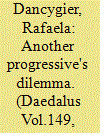

|
|
|
|
|
| Summary/Abstract |
Immigration and the diversity it brings have led to the emergence of the “progressive's dilemma” whereby open societies that take in immigrant outsiders may find it difficult to maintain the solidarity required to sustain the welfare state. In this essay, I address another progressive's dilemma: Focusing on the case of Western Europe, I argue that when open borders give rise to radical-right parties, immigration can inadvertently also endanger progressive achievements in gender equality. Though xenophobic policies frequently constitute their core message and the primary source of their appeal, radical-right parties are also defenders of traditional family values and outspoken critics of measures that promote the economic and political advancement of women. Moreover, the composition of these parties, both in terms of voters and politicians, is disproportionately male. As a result, when radical-right, anti-immigrant parties enter national parliaments, the descriptive and substantive representation of women suffers, sometimes reversing long-held gains in gender equality.
|
|
|
|
|
|
|
|
|
|
|
|
|
|
|
|
| 2 |
ID:
120360
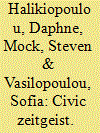

|
|
|
|
|
| Publication |
2013.
|
| Summary/Abstract |
This article examines the relationship between nationalism and liberal values and, more specifically, the redefinition of boundaries between national communities and others in the rhetoric of radical right parties in Europe. The aim is to examine the tension between radical right party discourse and the increasing need to shape this discourse in liberal terms. We argue that the radical right parties that successfully operate within the democratic system tend to be those best able to tailor their discourse to the liberal and civic characteristics of national identity so as to present themselves and their ideologies as the true authentic defenders of the nation's unique reputation for democracy, diversity and tolerance. Comparing the success of a number of European radical right parties ranging from the most electorally successful Swiss People's Party, the Dutch Pim Fortuyn List and Party for Freedom to the more mixed French Front National, British National Party and National Democratic Party of Germany we show that the parties that effectively deploy the symbolic resources of national identity through a predominantly voluntaristic prism tend to be the ones that fare better within their respective political systems. In doing so, we challenge the conventional view in the study of nationalism that expects civic values to shield countries from radicalism and extremism.
|
|
|
|
|
|
|
|
|
|
|
|
|
|
|
|
| 3 |
ID:
179769
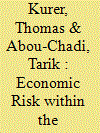

|
|
|
|
|
| Summary/Abstract |
This article investigates how unemployment risk within households affects voting for the radical right. The authors contribute to recent advances in the literature that have highlighted the role of economic threat for understanding the support of radical-right parties. In contrast to existing work, the authors do not treat voters as atomistic individuals; they instead investigate households as a crucial site of preference formation. Combining largescale labor market data with comparative survey data, they confirm the expectations of their theoretical framework by demonstrating that the effect of occupational unemployment risk on radical-right support is strongly conditioned by household-risk constellations. Voting for the radical right is a function not only of a voter’s own risk, but also of his or her partner’s risk. The article provides additional evidence on the extent to which these effects are gendered and on the mechanisms that link household risk and party choice. The results imply that much of the existing literature on individual risk exposure potentially underestimates its effect on political behavior due to the neglect of multiplier effects within households.
|
|
|
|
|
|
|
|
|
|
|
|
|
|
|
|
| 4 |
ID:
163780
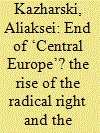

|
|
|
|
|
| Summary/Abstract |
The article analyses the effects of the migration crisis and the parallel rise of right wing parties on national and regional identities in Slovakia and the broader subregion of the Visegrad Four. It argues that the recent right wing political discourse around migration has been reshaping the meaning of ‘Central Europe’ as a normative project and an identity shared by the V4 countries. The post-Cold War narrative of Central Europe was a story of ‘returning to the West’, which in practice meant that normative conformity with the West was a precondition of membership in key Western institution. The situation has changed visibly after the migrant crisis, as the V4 political elites have now been constructing new identities, in partial juxtaposition with Western European liberalism. These new identities favour a culturalist, conservative interpretation of the nation and reject humanitarian universalism, epitomized by the European Union’s decision to welcome the refugees. This arguably devaluates the previous notion of ‘Central Europe’ as a region that seeks to identify itself firmly with the West. Slovakia is chosen as a case study because of the recent success of the radical right in the 2016 parliamentary elections. The article concludes that although the situation of being structurally locked into the EU does not allow the V4 countries to openly challenge its main principles, the V4 political elites pursue a counter-hegemonic strategy, subverting and resignifying some of its key political notions. One should, therefore, speak not of an end of ‘Central Europe’ but rather of its evolution into a new, hybrid stage, where normative conformity and identification with the West will only be partial. The article makes use of Laclau and Mouffe’s theory of discourse and related concepts as well as insights from constructivist geopolitics literature to track articulatory practices of the regional establishments. The study relies on evidence from recent political campaigning in Slovakia as well as official Visegrad Group documents from 2015 to 2016.
|
|
|
|
|
|
|
|
|
|
|
|
|
|
|
|
| 5 |
ID:
103383


|
|
|
|
|
| Publication |
2011.
|
| Summary/Abstract |
This article argues that radical right parties can be seen as displaying three patterns of opposition towards European integration: rejecting, conditional and compromising. These three patterns are identified through the careful examination of party attitudes on four different aspects related to European integration and the EU. These include the idea of a common identity of European peoples, the principle of cooperation at a European multilateral level, the EU policy practice and the desire to build a future European polity. In light of this conceptualization of radical right opposition to European integration, the article conducts a qualitative analysis of party literature of 12 radical right parties from 10 European countries during the latter part of the 2000s.
|
|
|
|
|
|
|
|
|
|
|
|
|
|
|
|
| 6 |
ID:
092320


|
|
|
|
|
| Publication |
2009.
|
| Summary/Abstract |
In considering how terrorist movements use the Internet, it is becoming increasingly apparent that we must move beyond predominantly descriptive overviews of the contents of websites to examine in more detail the notion of virtual communities of support and the functions of these for their members. Virtual communities in support of terrorist movements are real social spaces where people interact on a regular basis to disseminate their views, share their knowledge, and encourage each other to become increasingly supportive of movements that use terrorism to achieve their goals. Taken from a larger body of comparative qualitative research investigating the content and function of discourses created in virtual communities in support of terrorism, this article presents a thematic analysis of "Stormfront," a virtual community of the radical right.
|
|
|
|
|
|
|
|
|
|
|
|
|
|
|
|
| 7 |
ID:
086990
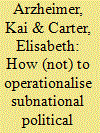

|
|
|
|
|
| Publication |
2009.
|
| Summary/Abstract |
Based on an aggregate analysis of the French regional elections of 2004, Kestilä and Söderlund, in their 2007 article, 'Subnational Political Opportunity Structures and the Success of the Radical Right: Evidence from the March 2004 Regional Elections in France', examine the impact of subnational political opportunity structures on the success of the radical right and argue that such an approach can control for a wider range of factors and provide more reliable results than cross-national analyses. The present article disputes this claim on theoretical, conceptual and methodological grounds and demonstrates that their empirical findings are spurious.
|
|
|
|
|
|
|
|
|
|
|
|
|
|
|
|
| 8 |
ID:
172425
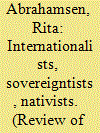

|
|
|
|
|
| Summary/Abstract |
Contrary to common assumptions that the liberal world order was ‘made in the West’, this article argues that it was produced in interaction with Pan-African ideology and actors. Developing a morphological analysis, it identifies three contending visions of world order within Pan-Africanism: a world of continental unity and transnational solidarity; a world of national sovereignty; and a world of racially defined units. It concludes that Pan-Africanism contains intellectual and political resources for the defence, reinvigoration, and invention of a more just, equal and rule-bound multilateral world, but that this cannot be taken for granted. Pan-Africanism is neither inherently progressive, nor reactionary, and can support multilateralism and sovereigntism in equal measure. Pan-Africanism's nativism also carries particular risks at a time when similar identitarian viewpoints are promoted by Radical Right movements. Understanding the manner in which Pan-Africanism informs and legitimises diverse political agendas is thus of crucial importance for IR, for Pan-Africanists, and for the future of world order.
|
|
|
|
|
|
|
|
|
|
|
|
|
|
|
|
| 9 |
ID:
158311
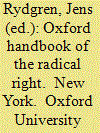

|
|
|
|
|
| Publication |
New York, Oxford University Press, 2018.
|
| Description |
xix, 734p.hbk
|
| Standard Number |
9780190274559
|
|
|
|
|
|
|
|
|
|
|
|
Copies: C:1/I:0,R:0,Q:0
Circulation
| Accession# | Call# | Current Location | Status | Policy | Location |
| 059360 | 303.48/RYD 059360 | Main | On Shelf | General | |
|
|
|
|
| 10 |
ID:
113139
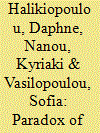

|
|
|
|
|
| Publication |
2012.
|
| Summary/Abstract |
What can explain the strong euroscepticism of radical parties of both the right and the left? This article argues that the answer lies in the paradoxical role of nationalism as a central element in both party families, motivating opposition towards European integration. Conventionally, the link between nationalism and euroscepticism is understood solely as a prerogative of radical right-wing parties, whereas radical left-wing euroscepticism is associated with opposition to the neoliberal character of the European Union. This article contests this view. It argues that nationalism cuts across party lines and constitutes the common denominator of both radical right-wing and radical left-wing euroscepticism. It adopts a mixed-methods approach, combining intensive case study analysis with quantitative analysis of party manifestos. First, it traces the link between nationalism and euroscepticism in Greece and France in order to demonstrate the internal validity of the argument. It then undertakes a cross-country statistical estimation to assess the external validity of the argument and its generalisability across Europe.
|
|
|
|
|
|
|
|
|
|
|
|
|
|
|
|
| 11 |
ID:
178157


|
|
|
|
|
| Summary/Abstract |
The radical Right in Europe and Islamist parties in Muslim countries have conventionally been portrayed as fundamentally different. The article uses material from Bangladesh to argue that the two share a wide set of characteristics and can be understood as fundamentally similar. Theoretically, we suggest a concept of the radical Right that encapsulates a set of deeper sentiments found to some extent in any culture or society. These deeper sentiments are normally obfuscated by attention-grabbing current events, but, isolated analytically, can be seen to give rise to parallel developments in different contexts. Our argument expands the theoretical value of the concept of the radical Right and helps understand recent political developments in Muslim-majority Bangladesh and, potentially, the wider authoritarian turn.
|
|
|
|
|
|
|
|
|
|
|
|
|
|
|
|
| 12 |
ID:
179324
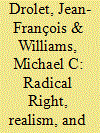

|
|
|
|
|
| Summary/Abstract |
The rise of the radical Right over the last decade has created a situation that demands engagement with the intellectual origins, achievements, and changing worldviews of radical conservative forces. Yet, conservative thought seems to have no distinct place in the theoretical field that has structured debates within the discipline of IR since 1945. This article seeks to explain some of the reasons for this absence. In the first part, we argue that there was in fact a clear strand of radical conservative thought in the early years of the field's development and recover some of these forgotten positions. In the second part, we argue that the near disappearance of those ideas can be traced in part to a process of ‘conceptual innovation’ through which postwar realist thinkers sought to craft a ‘conservative liberalism’ that defined the emerging field's theoretical alternatives in ways that excluded radical right-wing positions. Recovering this history challenges some of IR's most enduring narratives about its development, identity, and commitments – particularly the continuing tendency to find its origins in a defining battle between realism and liberalism. It also draws attention to overlooked resources to reflect upon the challenge of the radical Right in contemporary world politics.
|
|
|
|
|
|
|
|
|
|
|
|
|
|
|
|
| 13 |
ID:
158278
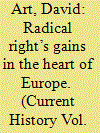

|
|
|
|
|
| Summary/Abstract |
Xenophobic nationalists have entered Germany’s federal parliament and Austria’s ruling coalition. Will the far right shed its pariah status or will it succumb to infighting as it has in the past?
|
|
|
|
|
|
|
|
|
|
|
|
|
|
|
|
| 14 |
ID:
178941
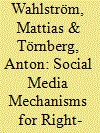

|
|
|
|
|
| Summary/Abstract |
This article maps mechanisms by which online social media activities may contribute to right-wing political violence. High-impact studies on the wave of right-wing and racist violence in the 1990s and early 2000s established that mass media discourse on immigrants and previous violent incidents had a significant influence on the prevalence of radical right violence. This link was captured by Koopmans's and Olzak’s notion of discursive opportunities. However, this was before the dominance of online social networks and social media, which changed the media landscape radically. We argue for broadening and refining the operationalization of the concept of discursive opportunities in social movement studies as well as including in our theoretical models new mechanisms brought about by the new online media. In relation to radical right and anti-immigrant mobilizations in Sweden in the 2010s, we elaborate and exemplify three mechanisms through which activities on social media may affect the incidence of violence: a) having an increasingly co-produced discursive opportunity structure, b) making inter-group dynamics in movement groups and networks trans-local, and c) sharing (rare) practical information and co-ordinating activities.
|
|
|
|
|
|
|
|
|
|
|
|
|
|
|
|
| 15 |
ID:
120129
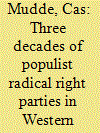

|
|
|
|
|
| Publication |
2013.
|
| Summary/Abstract |
The populist radical right constitutes the most successful party family in postwar Western Europe. Many accounts in both academia and the media warn of the growing influence of populist radical right parties (PRRPs), the so-called 'verrechtsing' (or right turn) of European politics, but few provide empirical evidence of it. This lecture provides a first comprehensive analysis of the alleged effects of the populist radical right on the people, parties, policies and polities of Western Europe. The conclusions are sobering. The effects are largely limited to the broader immigration issue, and even here PRRPs should be seen as catalysts rather than initiators, who are neither a necessary nor a sufficient condition for the introduction of stricter immigration policies. The lecture ends by providing various explanations for the limited impact of PRRPs, but it is also argued that populist parties are not destined for success in opposition and failure in government. In fact, there are at least three reasons why PRRPs might increase their impact in the near future: the tabloidisation of political discourse; the aftermath of the economic crisis; and the learning curve of PRRPs. Even in the unlikely event that PRRPs will become major players in West European politics, it is unlikely that this will lead to a fundamental transformation of the political system. PRRPs are not a normal pathology of European democracy, unrelated to its basic values, but a pathological normalcy, which strives for the radicalisation of mainstream values.
|
|
|
|
|
|
|
|
|
|
|
|
|
|
|
|
| 16 |
ID:
166651


|
|
|
|
|
| Summary/Abstract |
The relationship between the American far right and Russia has varied over time. During the Cold War, American right-wing populists were in the forefront of opposition to the Soviet Union. But as the Cold War waned, the far right became more sympathetic to Russia, viewing it as the last remaining white bastion nation in a world in which a “rising tide of color” threatened to engulf the white race. Despite the recent deterioration of relations between Russia and the United States, the contemporary alt-right is increasingly sympathetic toward President Vladimir Putin and his nationalist agenda. The realm of cyberspace presents new opportunities for the fledging alliance between Russia and its supporters among the alt-right.
|
|
|
|
|
|
|
|
|
|
|
|
|
|
|
|
|
|
|
|
|